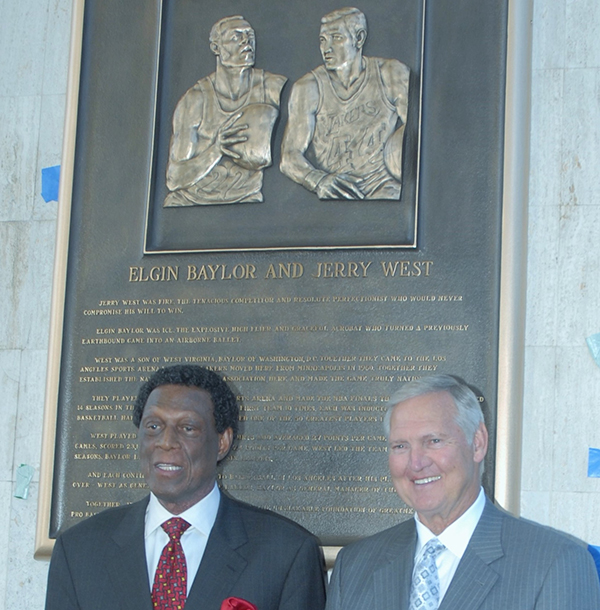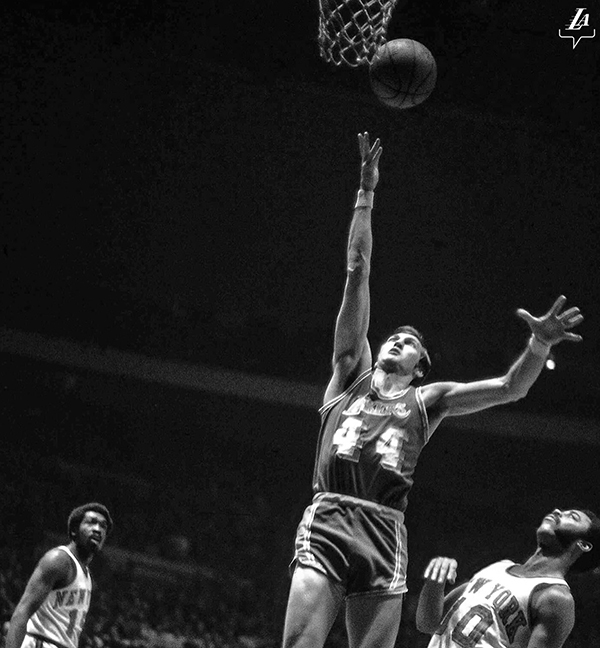Wave Wire Services
LOS ANGELES — Elgin Baylor, the smooth forward who lit up the scoreboard for the Los Angeles Lakers in the 1960s and later served as the general manager of the Los Angeles Clippers for more than two decades, died March 22 at the age of 86, the Lakers announced.
Baylor died of natural causes in Los Angeles surrounded by his wife Elaine and his daughter Krystal, the team said.
“Elgin was the love of my life and my best friend,” Elaine said. “And like everyone else, I was in awe of his immense courage, dignity and the time he gave to all fans. At this time we ask that I and our family be allowed to mourn his passing in privacy.”
Baylor, who still holds the record for most points scored in an NBA Finals game with 61 vs. the Boston Celtics in 1962, was inducted into the Basketball Hall of Fame in 1977.
His statue was added to those of other Lakers greats outside Staples Center in 2018.
“Elgin was the superstar of his era — his many accolades speak to that,” Lakers Governor Jeanie Buss said. “He was one of the few Lakers players whose career spanned from Minneapolis to Los Angeles. But more importantly, he was a man of great integrity, even serving his country as a U.S. Army reservist, often playing for the Lakers only during his weekend pass. He is one of the all-time Lakers greats with his No. 22 jersey retired in the rafters and his statue standing guard in front of Staples Center.
“He will always be part of the Lakers legacy. On behalf of the entire Lakers family, I’d like to send my thoughts, prayers and condolences to Elaine and the Baylor family.”
The Clippers also paid tribute to Baylor.
“The Clippers mourn the loss of Elgin Baylor, a transcendent player, a beloved teammate, and a pioneering executive,” a team statement said. “Baylor was a Long Angeles basketball institution, first as a superstar for the Lakers, then as the general manager of the Clippers, leading the team’s front office for 22 years. We extend our deepest condolences to the Baylor family.”
Baylor was born on Sept. 16, 1934, in Washington, D.C., and played one season at the College of Idaho before transferring to Seattle University, where he led the team to its first NCAA championship game before being drafted first overall by the Minneapolis Lakers in 1958.
The high-flying 6-foot-5-inch Baylor averaged 24.9 points, 15 rebounds and 4.1 assists en route to Rookie of the Year honors. He would go on to play 14 seasons for the Minneapolis and Los Angeles Lakers, earning NBA All-Star honors 11 times with 10 First Team All-NBA appearances.
The Lakers moved to Los Angeles in 1960, with Baylor and Jerry West leading them to the NBA Finals seven times in their first 10 seasons in the city, all losses.
Baylor’s 27.4 points-per-game average is third-highest in NBA history behind Michael Jordan and Wilt Chamberlain. He was among the 50 Greatest Players in NBA History selected in 1996 in conjunction with the league’s 50th anniversary.
After tearing his Achilles tendon in 1970, Baylor retired after playing nine games in the 1971-72 season, the day before the Lakers began their 33-game winning streak, the longest of any team in North America’s four major professional leagues. The team won its first NBA championship in Los Angeles that season.
When Baylor retired, Mal Florence wrote in the Los Angeles Times, “No man has contributed more to the success and popularity of the Lakers since they moved to Los Angeles from Minneapolis in 1960 than Baylor.”
Baylor went on to serve as a coach of the New Orleans Jazz and vice president of basketball operations for the Clippers from 1986-2008, winning NBA Executive of the Year honors in 2006.
In February 2009, Baylor filed an employment discrimination lawsuit against the Clippers, then-team owner Donald Sterling, president Andy Roeser and the NBA, alleging that he was underpaid during his tenure with the team and fired because of his age and race.
He later dropped the racial discrimination claims, and the remaining claims were rejected by a Los Angeles state court jury in 2011.
On April 6, 2018, the Lakers honored Baylor with a statue outside Staples Center, where his likeness joined those of West, Kareem Abdul-Jabbar, Magic Johnson, Shaquille O’Neal and the team’s late broadcaster Chick Hearn.
“I appreciate all the wonderful things people have said about me, but without the wonderful teammates this certainly would not have been possible,” Baylor said at the ceremony. “After about six decades of being around the NBA, I stand here before you today humbled, thankful, grateful for this recognition.”
Tributes to Baylor began pouring in after his death, with Lakers legend Magic Johnson tweeting: “RIP to the NBA’s first high flyer, Lakers Legend, & Hall of Famer Elgin Baylor. Before there was Michael Jordan doing amazing things in the air, there was Elgin Baylor! A true class act and great man, I’ll always appreciate the advice he shared with me when I first came into the (league).”
NBA Commissioner Adam Silver said Baylor “set the course for the modern NBA as one of the league’s first superstar players.”
“In addition to his legendary playing career, Elgin was a man of principle. He was a leading activist during the height of the civil rights movement in the 1950s and 1960s and an influential voice among his fellow players,” Silver added. “After his retirement, Elgin remained a part of the NBA family as both a coach and an executive, imparting his wisdom to generations of NBA talent. Elgin will be deeply missed, and we send our thoughts and prayers to his wife, Elaine, his family and friends.”
Local officials were also adding their remembrances.
“Lakers legend. NBA icon. Military veteran and extraordinary Angeleno. #ElginBaylor was a superstar. With his statue standing guard at Staples and his jersey hanging in the rafters, he will long be missed and always be remembered by L.A. sports fans,” Los Angeles Mayor Eric Garcetti tweeted.
“All Los Angeles mourns the loss of #ElginBaylor — a superstar both as a player and in life,” City Attorney Mike Feuer tweeted. “He was my #1 sports hero when I was growing up. His amazing moves on the court were like poetry (that I tried and failed hundreds of times to emulate) and his leadership qualities were a key to the Lakers’ success. Only later did I learn the man I admired so much for his talent was also an incredible leader and role model off the court, standing up for his fellow players and for civil rights. He will be profoundly missed.”













